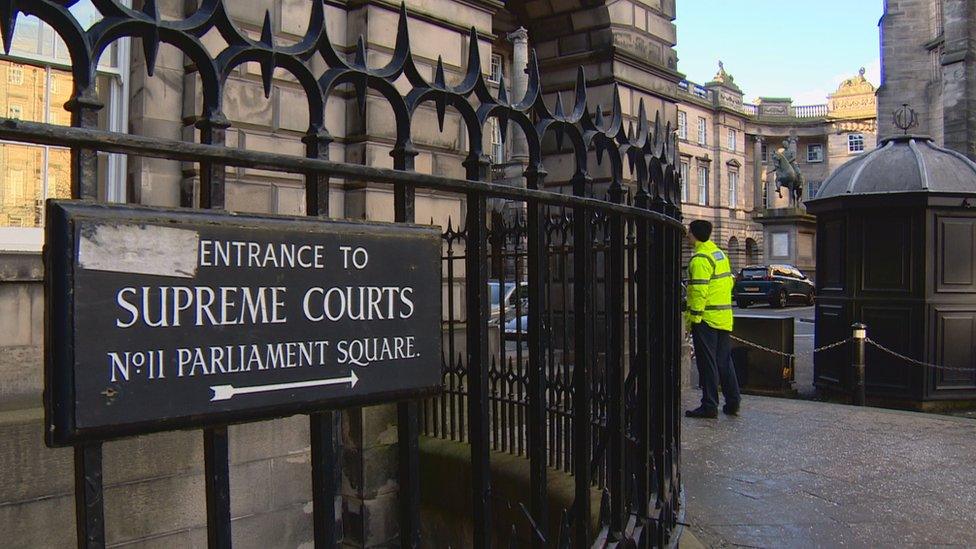Ex-undercover officer wins case against Police Scotland
- Published

The case was heard at the Court of Session in Edinburgh
A former undercover police officer has won a court action over her treatment after she expressed fears a colleague had compromised covert operations.
A judge ruled in the woman's favour after she raised an action against former Police Scotland Chief Constable Sir Stephen House.
Lord Brailsford found in her favour on the issue of liability.
The force said it noted the decision of the court and was now considering the terms of the judgment.
The woman, who joined Grampian police in 1990, brought a damages claim for £1m and maintained that she was a whistleblower.
But the court heard the officer, who won accolades and a commendation, was left feeling as if she had done wrong.
A 59-page judgement issued on Thursday, external said further procedures may be required to assess the compensation she is due.
The woman, known as Mrs K, who previously suffered health problems, was granted ill health retirement from the police suffering stress, anxiety and depression in 2013.
Two years earlier she was working in the special operations unit (SOU) at the Scottish Crime and Drug Enforcement Agency (SCDEA).
The agency no longer exists as it was incorporated into Police Scotland, which replaced the old eight-force model in April 2013.

The officer brought the case against former Police Scotland Chief Constable Sir Stephen House
She told the Court of Session in Edinburgh how she went to a covert mail box operated by a fellow detective sergeant and found unopened mail containing bank statements, phone bills and letters from debt collectors.
The woman said: "My stomach fell. I felt physically sick. Obviously there was something not right here."
She said there were bank statements and phone bills in names she had never previously heard.
The officer said she was she was "extremely concerned" and feared that covert operations and individuals involved in them may be compromised.
She informed a senior officer and then went to premises she had been using as an office with the detective sergeant and discovered it had been ransacked.
'Crime scene'
The officer found boxes and bags of unopened documents and mail and evidence that some materiel had been shredded.
Among the material were documents relating to pseudonyms unknown to her such as bank cards, phone bills and passports. Cash was also found.
She told the court that none of the items were present when she was last at the premises and said to her it was "a crime scene".
The following day, 7 April 2011, she again attended the covert premises with Det Insp Danny Rae who said what he found constituted "a total disaster".

The Scottish Crime and Drug Enforcement Agency was based at Osprey House in Paisley
Lord Brailsford said: "There was no doubt in the mind of the pursuer that all senior management within SCDEA, including the head of the intelligence department, Chief Superintendent Stephen Whitelock, regarded the situation which had been uncovered as extremely serious and to constitute a significant risk of compromising the work of the units."
The woman said documentation was taken back to the SCDEA base at Osprey House in Paisley, Renfrewshire.
She and another officer were then told to buy a garden incinerator and petrol and burn them.
The woman said retired detectives who were back working for the organisation were saying: "What is going on? This is like Life on Mars."
Intelligence officers were then told to go in a surveillance vehicle to the other side of the river and burn it but uniformed colleagues arrived and they were then told to set the material alight in a secured yard at Osprey House.
Her fellow detective sergeant, known as DSG, returned from annual leave later that month and met senior officers.
Felt 'degraded'
The judge said DSG accepted responsibility and indicated that the female officer had not been involved and had no knowledge of what had been uncovered.
DSG was admitted to a psychiatric unit the following day.
An internal investigation was launched and as part of it the woman was questioned by detectives over two and a half days which left her feeling "degraded".
During a further meeting with more senior officers she was told she was being suspended from her role as an undercover operative.
She said she could not understand why this was happening as she was the innocent party and the officer who had discovered the problem being investigated.
The judge said: "She further stated that her distress was a reaction to being informed by police colleagues that she was part of a process in which SCDEA were effectively using her as a scapegoat and that the outcome of the investigation would be the termination of her career."
The former Grampian police officer was later transferred to work in a witness protection unit which she said she was told was a temporary move.
Ch Supt Whitelock accepted that he made the decision that the woman should no longer work at the special operations unit and said he no longer had confidence in her professional judgement.
The officer brought the action against the chief constable claiming it was the force's duty to treat her fairly in carrying out an investigation and not to take disciplinary action against her or to move her permanently from her post with giving her fair treatment.
It was maintained that the force's duties included not moving her from her post on the basis of preliminary findings which had not been the subject of proper investigation, which she had not been made aware of and did not have the opportunity to respond to.
The chief constable contested the claim.
'Deliberately misled'
Lord Brailsford said: "A decision was taken by Ch Supt Whitelock that the pursuer should not, after discovery of the events in relation to DSG's mismanagement, ever work in SOU again.
"That decision was taken apparently without consultation with any other person."
He said the decision was not subjected to "objective evaluation or scrutiny" and the pursuer was not given a right of reply.
The judge added: "These considerations would, of themselves, in my view constitute a lack of fair treatment in the context of an employee-employer relationship."
He said the pursuer was also told her move from SOU was only temporary and was "deliberately misled".
The woman's lawyers welcomed the decision.
In a statement BTO Solicitors said: "This is the best possible outcome for a valued client who displayed great courage throughout proceedings.
"Our client was a very committed and loyal undercover officer who sadly had her successful career cut short.
"The court has recognised the lack of fair treatment afforded to her and the resultant devastating impact which this has had on her both professionally and personally.
"We now move on to the next stage of this litigation and have no further comment to make."